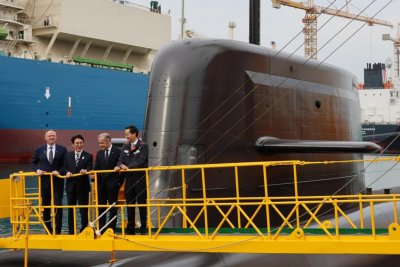Hanwha pitches broad defense package to boost bid for Canada submarine

Canadian Prime Minister Mark Carney (2nd R) and Canadian Defense Minister David McGuinty (L), accompanied by South Korean Prime Minister Kim Min-seok (2nd L) and Hanwha Group Vice Chairman Kim Dong-kwan, inspect South Korea’s first 3,600-ton-class naval submarine, named Jang Yeong-sil, during their visit to Hanwha Ocean Co.’s shipyard on Geoje Island in South Gyeongsang Province, southeastern South Korea, 30 October 2025. File. Photo by YONHAP / EPA
Jan. 27 (Asia Today) — South Korea’s Hanwha Group is mounting an unusually broad industrial and technology campaign to strengthen its bid for Canada’s multibillion-dollar next-generation submarine program, extending its proposal well beyond shipbuilding to include steel, artificial intelligence and space-based infrastructure.
Hanwha said Monday that its defense units are offering what it described as a comprehensive “K-defense package” tailored to Canada’s emphasis on local industrial participation and economic offsets under its Canadian Patrol Submarine Project.
At the Korea-Canada Industrial Cooperation Forum held in Toronto on Sunday, Hanwha Ocean and Hanwha Systems signed memorandums of understanding with Canadian partners across five sectors: steel, AI, satellite communications, space technology and electro-optics.
As part of the effort, Hanwha Ocean agreed to cooperate with Algoma Steel, Canada’s largest steel producer. The agreement includes plans to invest about 345 million Canadian dollars to help establish a stable steel supply chain in Canada for submarine construction and long-term maintenance, repair and overhaul work, contingent on winning the contract. Hanwha said the approach goes beyond material procurement by directly supporting local manufacturing capacity.
In AI, Hanwha Ocean and Hanwha Systems signed a three-party MOU with Canadian startup Cohere to jointly develop specialized AI tools for shipbuilding, including production planning, design and manufacturing, as well as submarine system integration and operations. Cohere, which has received backing from companies such as Nvidia and Oracle, is valued at more than $7 billion, according to industry estimates.
Hanwha Systems also reached agreements with Telesat on low-Earth orbit satellite communications and with MDA Space and PV Labs on defense-related satellite and electro-optical technologies. The companies plan to link satellite platforms with Hanwha’s defense electronics to provide secure communications, command and control and data resilience for submarine operations.
The submarine bid has drawn strong backing from the South Korean government. Senior officials, including Presidential Chief of Staff Kang Hoon-sik and Trade, Industry and Energy Minister Kim Jeong-kwan, accompanied the delegation to Canada in what Seoul described as full-scale “sales diplomacy.” The government has designated the submarine project a national strategic export and proposed expanding cooperation to other sectors such as automobiles and hydrogen energy.
Consulting firm KPMG estimated that Hanwha’s proposed industrial cooperation framework could generate more than 200,000 person-years of employment in Canada between 2026 and 2040, a projection seen as a powerful selling point in a country where job creation and regional economic development are key political priorities.
— Reported by Asia Today; translated by UPI
© Asia Today. Unauthorized reproduction or redistribution prohibited.
Original Korean report: https://www.asiatoday.co.kr/kn/view.php?key=20260127010012673
